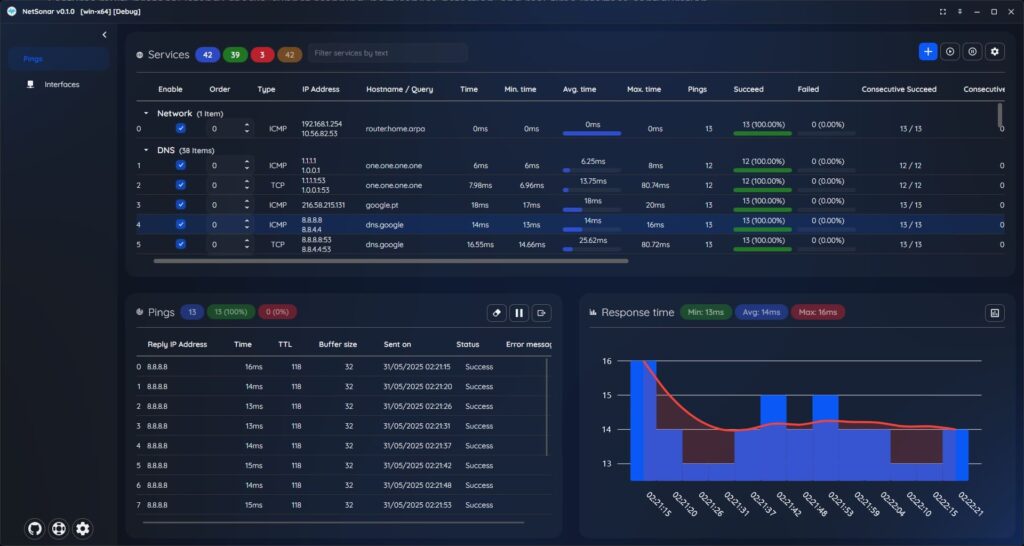Independent developer sn4k3 has released the latest version of NetSonar, an open-source, lightweight, and modern network diagnostic utility that is quickly gaining traction among system administrators, developers, and IT enthusiasts.
The tool allows users to perform multi-protocol pings (ICMP, TCP, UDP, HTTP), manage network interfaces, scan subnets, and detect local devices or services in real-time — all from a clean, intuitive interface that works seamlessly across Windows, macOS, and Linux.
🔧 Core Features of NetSonar
- Advanced Pings: Check availability and latency over ICMP, TCP, UDP, and HTTP.
- Interface Management: View and configure IP addresses, interface stats, and network status.
- Network Scanning: Discover devices and services within your local network.
- Real-Time Visualization: Integrated with LiveCharts to provide dynamic performance graphs.
- Modern & Customizable UI: Built with Avalonia and SukiUI, featuring Fluent-style theming and personalization.
- Cross-Platform Compatibility: Runs on Windows 10+, macOS 13+, and Linux (Debian, Ubuntu, Fedora, Arch, openSUSE, etc.) for both x64 and ARM64 architectures.
🚀 Easy Installation on Any OS
NetSonar offers straightforward installation methods using package managers and automated scripts:
- Windows (via Winget)
winget install -e --id PTRTECH.NetSonar - Linux (Debian, Fedora, Arch, openSUSE, etc.)
bash -c "$(curl -fsSL https://raw.githubusercontent.com/sn4k3/NetSonar/main/scripts/install-netsonar.sh)" - macOS
bash -c "$(curl -fsSL https://raw.githubusercontent.com/sn4k3/NetSonar/main/scripts/install-netsonar.sh)"
Rolling back to previous versions is also supported — simply specify the version number in the script during installation.
💻 Minimum System Requirements
- Windows 10 or later / macOS 13 Monterey or later / Modern Linux distributions
- 64-bit processor (x64 or ARM64)
- 4 GB RAM or more
- Minimum resolution of 1920×1080 @ 100% scale
🌍 An Open-Source Project Backed by the Community
Written in C# (.NET), NetSonar is distributed under an open-source license, with its codebase available for contributions on GitHub. The project encourages developers to submit improvements, bug fixes, and feature requests.
The author also accepts support through GitHub Sponsors or direct PayPal donations, highlighting the community-driven nature of the tool.
With its clean codebase, modern design, and the flexibility of running on multiple platforms, NetSonar positions itself as a practical alternative to traditional command-line tools like ping and traceroute, or heavier graphical solutions such as Wireshark.
🧭 Why NetSonar Matters
NetSonar bridges the gap between basic command-line diagnostics and enterprise-grade analysis platforms. It gives system admins, DevOps teams, and developers the ability to:
- Quickly test connectivity across protocols.
- Monitor latency and performance with live charts.
- Manage and troubleshoot interfaces in real-time.
- Discover hidden devices and services within a network.
Its combination of simplicity, portability, and visual insights makes it particularly useful in environments where administrators want fast answers without deploying heavyweight tools.
👉 Official repository: github.com/sn4k3/NetSonar
⚖️ Would you like me to extend this into a side-by-side comparison with tools like Nmap and Wireshark, highlighting where NetSonar excels (lightweight, real-time visual pings, cross-platform) versus where traditional tools still dominate (deep packet inspection, advanced security scans)? That could make the article even more compelling for a tech news site.

